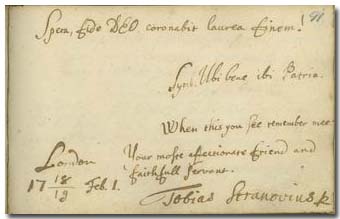
Spera, fide DEO coronabit laurea finem!
Symb[olum]. Ubi bene ibi Patria. *
London
1718/19 Feb. 1.
When this you see remember mee.
Your moste affectionate friend and faithfull Servant.
Tobias Stranovius.
|
* The source of the motto is Cicero,
Tusculanae disputationes 5.108, quoting from Pacuvius and
Aristophanes: “Patria est, ubicumque est bene”
The same is quoted in Proverbiae Senecae 43. (“Non eris in
patria: patria est ubicumque bene est. Illud enim, per quod
bene est, non in loco, sed in homine est.”) For
another version of the same motto, cf. the note of Michael
Theophil Bauer on p. 95.
|
|
|
Hope and believe in God, at the end you will be crowned with
laurel!
Motto: Where you are well off,
there is your fatherland. *
London, February 1 1718/19.
When this you see remember mee.
Your moste affectionate friend and faithfull Servant.
Tobias Stranovius
|
p. 91.
London, 1719 február 12
Stranover, Tobias
(1684-1756), Transylvanian Saxon
painter in England
Tobias
Stranover (Stranovius) was born in Nagyszeben (Sibiu) in 1684, a
son of the local painter Jeremias Stranover (?-1702). His elder
brother, Jeremias Stranover (?-?) was also a painter in
Nagyszeben, just like his father-in-law, Jakab Bogdány (c.
1660-1724). He was baptized on October 7. He learned with his
father-in-law in London, then he worked in the Netherlands,
Hamburg, Dresden, Nagyszeben and London. He died on February 26,
1756, most probably in London. He painted very popular still lives
of fruits and animals in the style of his father-in-law. His works
are kept in the Kunsthalle of Hamburg, the Landesmuseum of
Schwerin, and several other German collections, as well as the
Brukenthal Museum of Nagyszeben. Two of his paintings can be seen
in the Museum of Fine Arts in Budapest.
From a letter written by Ferenc Pápai Páriz Jr. to
Sándor Teleki from London on September 25, 1715 we know that Tobias Stranovius
had arrived to England in the company of the Constantinopolitan
English Ambassador William Paget, when this latter had travelled
through Transylvania thirteen years earlier, that is in 1702 [Jankovics 147,
Peregrinus 59]. Pápai Páriz adds to this that Stranovius “already
excels amongst painters”, and the motto of this latter written in
1719 in the Album also indicates his being well off in his new
fatherland. His dedication is the only note in English in the
Album. The above mentioned travel of Paget is also described in
the diary of Edmund Chishull (1671-1733) which was published in
1747 in London with the title Travels in Turkey and back to
England [Gömöri: Angol utazó]. (Chishull also mentions his
conversation with Professor Sámuel Kaposi
in Gyulafehérvár/Alba Iulia.)
According to most lexicons Tobias Stranovius died
after 1724, while others suppose him to have died after 1731.
However, he is mentioned as being in life in 1733 by his
brother-in-law William Bogdani. On p. 396 of vol. 25 (1756) of the London Magazine
a laudatory poem dedicated to him mentions the exact date of his
death: February 26, 1756 [Gömöri: Lord Paget].
• MűvLex • Thieme-Becker |

